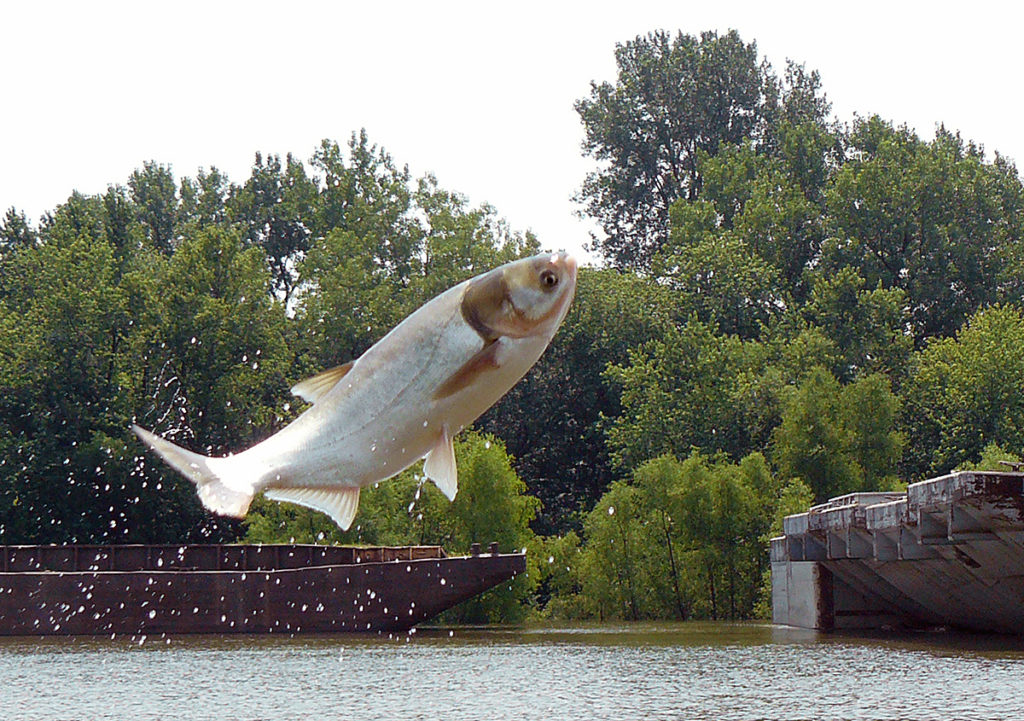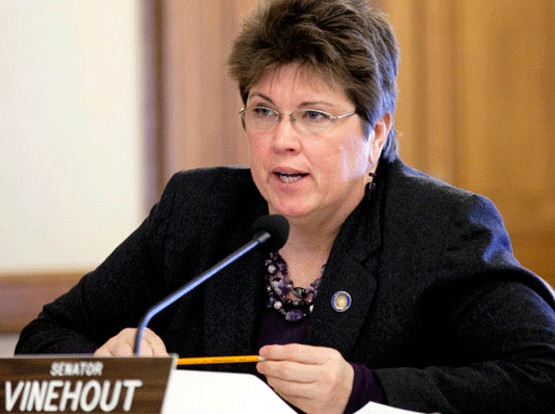State News: Asian Carp, Health Care, Kathleen Vinehout
- Share
- Tweet
- Pin
- Share
Asian Carp Found Nine Miles From Lake Michigan

Silver carp photo courtesy of Michigan Sea Grant.
A commercial fishermen caught an Asian carp nine miles from Lake Michigan on June 20. The silver carp, one of numerous species of the invasive fish, is the first that’s been found beyond electric barriers in Illinois waterways designed to keep the invasive fish out of the Great Lakes.
The fish was caught just below a lock and dam on the Little Calumet River, said Charlie Wooly, deputy regional director with the U.S. Fish and Wildlife Service. Wooly said the fish was found 28 miles above the Army Corps of Engineers’ electric barriers.
“We will be monitoring from the T.J. O’Brien Lock and Dam nine miles up towards Lake Michigan and about 16 to 18 miles below the lock and dam to see if there are any more silver carp in the vicinity,” he said.
Wooly said state and federal agencies will do intensive sampling for two weeks. If more fish are found, he said they may use huge nets to capture and clear Asian carp from the area.
A bighead carp was discovered above the barriers in 2010. The silver carp has been sent to Southern Illinois University for testing to determine its origin. Tim Schweizer, spokesman with the Illinois Department of Natural Resources, expects results may be available within the next few weeks.
Jennifer Caddick, vice president of communication and engagement with the Alliance for the Great Lakes, said the finding highlights the need for urgent action to prevent the fish from entering the Great Lakes. She said that includes release of a draft study by the Army Corps of Engineers that outlines options for preventing the spread of Asian carp that was originally slated to be revealed in March.
“The study has been paid for with our taxpayer dollars. It’s ready for public review,” she said. “Unfortunately, its release has been blocked by the Trump administration, so it’s just sitting on a shelf in Washington collecting dust.”
Badger State Ranked 16th Worst for Rural Roads
A new report suggests 19 percent of Wisconsin’s rural roads are in poor condition and 10 percent of the state’s bridges in rural areas are deficient.
National transportation research group TRIP studied federal road and bridge records for all 50 states. The data shows Wisconsin was ranked 16th for most rural roads in poor condition.
“Almost one out of every five miles of rural roads that you drive on in Wisconsin are in poor condition. That means there is significant rutting, cracks and potholes on these roads,” said Carolyn Kelly, associate research director for TRIP.
Kelly said the federal gas tax isn’t keeping up with inflationary costs of road maintenance. She said Congress could help the situation by creating a user-based, revenue stream to fully fund the nation’s transportation programs.
In Wisconsin lawmakers are deadlocked over how to fund transportation projects in the next state budget. Town of Farmington Chairman Mike Hesse said he’s hopeful that state and federal lawmakers can make the politically unpopular choices needed to raise revenue for local governments.
“It’s nice to keep your budget level low and not raise taxes but there is inflation that we’re experiencing, especially on building materials for roads.”
Hesse said his town recently had to borrow $400,000 for its first road reconstruction project since 1975.
Ozone Study Seeks Answers to Drift
High levels of the air pollutant ozone still plague a few Wisconsin counties along the Lake Michigan shoreline. During the past month, a team of scientists has taken to the sky and water to better map the origin of some of the chemicals that create the harmful ozone in the lower atmosphere.
On June 2 and 11, the Wisconsin Department of Natural Resources announced ozone levels in five counties along Lake Michigan had entered an “orange” category. That meant the air those days was unhealthy for sensitive groups such as older adults, children and people with respiratory ailments.
It’s no surprise to scientist Brad Pierce of the National Oceanic and Atmospheric Administration that ozone remains a concern along the western shore of the lake. He said this time of year, wind often brings cooler air off the water to collide with warmer air over the land.
“What that does is it leads to transport of pollutants from along the shore – Chicago, Milwaukee and various point sources along the way. They tend to narrow themselves and converge right along the lakeshore,” said Pierce, lead researcher on this year’s effort based at the University of Wisconsin-Madison.
Pierce said ground monitors show ozone readings right along the lake are higher than just a few miles inland.
Vinehout Registers to Run For Governor

Democratic state Sen. Kathleen Vinehout has registered to run for governor, the first step in officially launching a campaign.
Vinehout, of Alma, filed the paperwork June 14 to register a campaign committee. She told The Associated Press on Wednesday she still has not decided whether she’s actually running. Vinehout said the move was done to account for expenses she incurs while traveling the state for a potential run.
Vinehout has been in the state Senate since 2007 and ran for governor in the 2012 recall attempt against Gov. Scott Walker. She finished a distant third in the primary and was considering running again in 2014 but decided against it after she was involved in a car crash.
Anthem Withdrawing From Wisconsin’s Exchange
Anthem Blue Cross Blue Shield is leaving Wisconsin’s federal health care exchange at the end of the year. The company said the state’s individual insurance market “remains volatile,” making it increasingly difficult to price and plan coverage through the Affordable Care Act.
A spokesman also pointed to “continual changes and uncertainty in federal operations, rules and guidance.”
Anthem offers individual plans both on and off the ACA’s exchanges in 44 Wisconsin counties. Starting next year, the company will only offer one off-exchange plan in one county: Menominee County.
The company insures about 18,500 individual subscribers in the state.
Anthem is also leaving individual markets in Indiana and Ohio.
Wisconsin Republicans said Anthem’s decision shows the health care law also known as Obamacare is failing and offering consumers fewer options over time.
Democrats argue the Trump Administration is unsettling the market by considering an end to federal payments to insurers to cover subsidies offered on individual plans.
Wisconsin Health News reports one other company, Health Tradition Health Plan, also plans to pull out of Wisconsin’s individual market.
The other 13 insurers plan to stay, though they may change the types of coverage they offer or which parts of the state they serve.
Wisconsin Public Radio, © Copyright 2017, Board of Regents of the University of Wisconsin System and Wisconsin Educational Communications Board.
